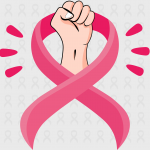In these uncertain times, the annual celebration of Breast Cancer Awareness Month is a welcomed tradition. While it's true that many of our in-person gatherings have converted to virtual ones, this has not dampened the power of pink in our lives.
breast cancer treatment
To kick off our new interview series Making the Rounds, we invited surgical oncologist Dr. Ogori Kalu to our New York office for a Facebook Live video streaming session to help educate the public on breast cancer prevention. Take a few minutes to learn about the discredited myths, and to watch the interesting round-table discussion with this Stanford-educated doctor.
Perhaps the most debilitating part of breast cancer treatment is chemotherapy. A new report by an international team of researchers suggests a means of more precisely determining which patients do or do not require chemotherapy.
Recent research has made some progress in finding an effective treatment for triple negative breast cancer — specifically, cancers that don't have either growth factor or hormone receptors. These are the most difficult to treat successfully, since there are no targeted therapies for them.
A study published online in Annals of Surgical Oncology reports that a week-long course of accelerated partial breast irradiation (APBI) after lumpectomy reduced rates of breast cancer recurrence and led to a 10-year survival rate of 96 percent. APBI is a localized form of radiation treatment meant to eliminate breast cancer cells that may remain after lumpectomy surgery.
Ductal carcinoma in situ (DCIS) is the presence of abnormal cells inside a milk duct in the breast. DCIS is considered the earliest form of breast cancer, and is the most common type of non-invasive breast cancer. DCIS

